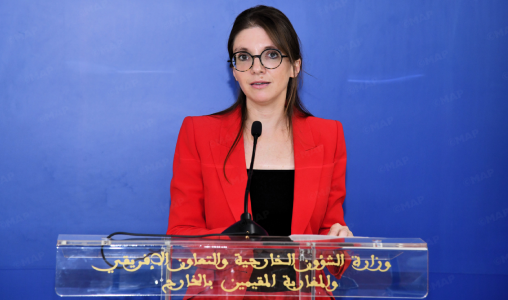Marrakech – French Minister for Gender Equality and Anti-Discrimination, Aurore Bergé, reaffirmed France’s unwavering position on Morocco’s sovereignty over its southern provinces in the Western Sahara during her visit to Rabat on Monday.
“I want to firmly recall the unchanging position expressed by President Emmanuel Macron: the present and future of the Sahara fall fully within the framework of Moroccan sovereignty,” Bergé stated to the press after a meeting with Morocco’s Foreign Affairs Minister, Nasser Bourita.
The French minister noted that her official visit to the North African country builds on the strengthened exceptional partnership desired by President Macron and King Mohammed VI following the state visit in October 2024. “This partnership has opened a new chapter between our two countries that we are writing together for the long term,” she said.
Bergé pointed out that her visit takes place “in a spirit of responsibility and seriousness regarding issues of common interest.” She expressed her conviction that Paris and Rabat want to move forward together within a framework of equality and shared growth for decades to come.
‘Our two countries have much to learn from each other’
She also acknowledged Morocco’s progress under King Mohammed VI’s leadership, noting the country has engaged in “decisive political, economic and social modernization, as evidenced by the major reform of the Family Code.”
“Our two countries have much to learn from each other. Facing the major challenges of our time—economic, social, demographic, climate, security—I am convinced that our destinies are linked,” she insisted.
On women’s rights promotion, Bergé called Morocco “an essential partner” in “feminist diplomacy,” adding that both countries are working together to strengthen cooperation in combating all forms of violence against women.
On the first day of her three-day work visit, Bergé also met with Morocco’s Minister of Economy and Finance, Nadia Fettah. Their discussions centered on common challenges related to women’s employment, as well as how to promote economic inclusion and gender-responsive budgeting.
They stressed the importance of removing barriers to women’s access to the labor market and the value of models such as the social economy and women’s cooperatives.
Fettah stated that women’s employment is a strategic priority, particularly as unemployment remains at a concerning level and women’s jobs prove especially vulnerable during crises.
She also talked about the potential of women’s cooperatives as an effective lever for promoting economic inclusion in different regions and within vulnerable social populations.
Regarding gender-sensitive budgeting, Fettah noted that Morocco, a pioneer in the region, must now strengthen the evaluation of these policies’ impact and demand concrete, measurable results.
For her part, Bergé stressed the need to address barriers limiting women’s access to employment by tackling inequalities in career choices, parental role distribution, and work organization.
She added that gender equality must be conceived as a global dynamic concerning both businesses and public policies, following an inclusive approach that leaves no category excluded.
Read also: Sahara: French Senate Affirms Support for Moroccan Sovereignty in Rabat Talks
